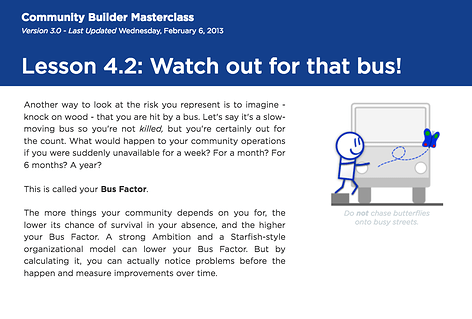Not only is it possible - it’s important  right now, it sounds like your “bus factor” is high, as in how bad things would be if you got hit by a bus besides the obvious terribleness of being hit by a bus. Time to work on that.
right now, it sounds like your “bus factor” is high, as in how bad things would be if you got hit by a bus besides the obvious terribleness of being hit by a bus. Time to work on that.
Truth be told, MOST folks in your position have dangerously high bus factors even when they aren’t the only one doing the job 
There’s a bunch of different ways to approach this, but with a tight-knit community like yours this can be especially awesome for having your members feel an even greater sense of “shared ownership” in a less formal sense.
Rather than try to establish a single community manager, I would look for ways to deputize the specific things that need doing on a daily basis and invite folks to sign up to help take care of things while you’re gone. Giving people specific things they can help take care of really helps.
In a lot of cases, people are happy to step up if you invite them to…especially if it’s something in the space they are personally invested in and get a lot of value from. People take care of stuff they care about. Funny that, eh? 
Think of this as a potentially valuable operational exercise -
First, take the opportunity to self-audit all of the things that need to happen, and how they get done. end up with a big 'ol list of things you do to keep things running smoothly.
Next give each item a score of 1, 2, 3, or 4. If an item is a 1, it means that it can only be done by you. If an item a 2, it can be done by somebody else but transferring the knowledge/skills/resources to them would be a fair bit of work. If an item is a 3, it can easily be done by somebody else in the community. And finally, if an item is a 4, it’s something that people already help with, even if it’s not consistent.
Start with 4s. They’re low hanging fruit, all it takes is asking for help.
Then look at 3s, and figure out which things are most valuable/important. Prioritize them.
With 2s, think hard about who your potential backup “deputies” could be. You need to trust them, and they need to know that you trust them. You’re going to invest time in sharing with them, so make it worth it.
If you’ve done a good job, you don’t have many 1s. If you DO have a lot of 1s…be honest with yourself, do you really have to be the one who does it, or do you just prefer it that way? A lot of the people unnecessarily treat elements of their jobs as 1s…when they’re really opportunities to federate and share.
Final thought here, I’m gonna borrow a term I learned from Joy Stephan (who hangs out on this list - hi Joy!): remember the difference between “volunteering” and “voluntelling” - your goal here isn’t to tell folks “I need to you to do XYZ” but instead “hey…could anybody lend a hand?”
This isn’t gonna happen overnight, and there will be bumps in the road. The best part when you get back is you’ll learn a) how most things are fine without you and b) what ISN’T fine without you…and then you can prioritize making that depend less on you. It’s scary…but so liberating on the other side, I promise. 
Good luck!
···
The #1 mistake in community building is doing it by yourself.
Better Coworkers: http://indyhall.org
Weekly Coworking Tips: http://coworkingweekly.com
My Audiobook: https://theindyhallway.com/ten
On Tue, Feb 14, 2017 at 3:25 AM, David Hamilton [email protected] wrote:
Hello,
I run a small co-working space in a big city - it’s around 20 members who are mostly monthly members who let themselves in using a phone app. I’m the only person managing the space - it’s small.
BUT - I need to go overseas for 2 weeks - I’m worried about new people coming to the space and not being able to show them the space and make sure they’re okay. Should I create a way to an automated system to add more people or should I hire someone to manage the space while I’m gone? Would it be reasonable to establish someone as a “community manager” and compensate them with the use of the space? The space doesn’t make a ton of money, so any wages could make the space unsustainable.
Any recommendations? (I need to get away!)
Best!
-David
–
Visit this forum on the web at http://discuss.coworking.com
You received this message because you are subscribed to the Google Groups “Coworking” group.
To unsubscribe from this group and stop receiving emails from it, send an email to [email protected].
For more options, visit https://groups.google.com/d/optout.
